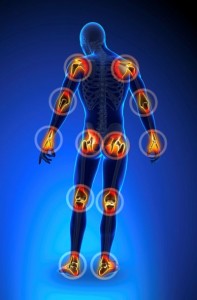Physical therapy is a type of specialized rehabilitative care that focuses on the prevention, treatment, and management of disorders associated with the joints and muscles. Licensed physical therapists are experts in human anatomy and the science of movement, or kinesiology. For this reason, a good physical therapist is uniquely qualified to help in ways that other practitioners are not. Physical therapists often work as part of a treatment team to manage complex conditions and assist patients on their road to wellness. Orthopedic injury and chronic or acute back pain are common reasons to seek treatment, but physical therapists handle many other conditions as well.
1. Fibromyalgia
Fibromyalgia is a very complicated disorder hallmarked by widespread and often excruciating pain, as well as such symptoms as “brain fog,” sleep disorders, and depression. Many experts believe that it is a disorder in the way the brain processes incoming signals from the rest of the body. Because each person has different triggers, different pain levels, and different sensations, treatment must be highly individualized. A good physical therapist is an expert at developing personalized treatment plans that combat the pain without triggering a flare-up.
2. Arthritis
Because physical therapists are experts in muscles and joints, they play a very important role in managing arthritis. You will learn about body mechanics, new ways of moving that support your joints rather than straining them, and when and how to apply ice and heat. Your physical therapist will designed a customized exercise program for you to strengthen the supporting muscles, help you realign your joints, and build a strong core. The goal is to enhance your range of motion and build your overall fitness while respecting your body’s limitations and minimizing pain.
3. Sports Injury Prevention
Once nearly exclusive to world class athletes, sports injury prevention programs have proven extremely valuable to weekend warriors and amateur athletes as well. These personalized programs focus on correcting any existing microtraumas or minor injuries, prescribing specific exercises to build strength and stability, and planning a long-term workout routine that is appropriate for your sport yet uniquely designed for you.
4. Injury Rehab
After an ACL tear or other major injury, your body needs the opportunity to heal and recover. If you need surgery, physical therapy can help prepare your body for it, improving outcomes and reducing healing time. After surgery, a physical therapist can create an individualized rehabilitation program based on your current physical condition and overall goals. If you want to return to full-contact sports, physical therapy can help you work towards that goal in a safe and healthy way.
5. Desk Job
If you work at a desk job, you are at heightened risk for back and neck pain, and even long-lasting postural disorders. Physical therapy can help work out the kinks and ensure that they don’t turn into permanent problems. Your physical therapist will assess your current health condition and ask detailed questions about your office setup. Based on this analysis, you will receive a personalized treatment plan that incorporates treatment procedures, home exercises, and instructions for creating a more ergonomic workspace.
6. Repetitive Use Conditions
Tennis elbow, carpal tunnel syndrome, and other repetitive use conditions can cause chronic pain and severely limit your range of motion. Physical therapists are experts at identifying the activities of daily living that can trigger a flare-up, and designing work-around techniques that allow you the time to heal. You will also receive both in-office treatments and home exercises designed to strengthen the associated muscles and minimize the chances for your condition to recur.
7. Acute or Lingering Pain
If you feel a sharp, acute pain during your workout, immediately stop to ice it and rest. If the pain does not subside within a few days, contact a physical therapist. In many cases, an acute injury that is caught early can be quickly treated with physical therapy, avoiding the need for more complicated medical procedures or even surgery.
If your pain is dull but lingers or recurs with activity, it is equally important to see a physical therapist. These can be warning signs of a chronic pain condition that could worsen over time. Your physical therapist will diagnose the source of your pain and work with you to immediately correct it and prevent future problems.
8. Swelling or Other Changes
You know your body, and you know what is normal for you. If you observe swelling or other changes in your wrist, ankle, or other part of the body, especially after a workout, contact a physical therapist as soon as possible. Early treatment is the key to avoiding mounting problems that could eventually require a major medical intervention.
9. Fall Prevention
Older adults, as well as those who are on certain medications or suffering from balance disorders, are at increased risk for falls. Physical therapists understand the complex interplay between the various systems of the body that are responsible for keeping you upright, as well as the role that your environment can play in increasing the risk for falls. Your physical therapist will provide a comprehensive fall prevention plan, which might include making modifications to your home or office.
10. Adolescent Conditions
The adolescent growth spurt is a common time for underlying postural and musculoskeletal disorders such as scoliosis and kyphosis to make themselves known. Young athletes are at enhanced risk for developing such conditions as Osgood-Schlatter disease, knee pain, and Sever’s disease due to the repeated pounding they take in their growth plates. A physical therapist can assess your child for these and other common conditions and develop a personalized rehabilitation and strengthening program to help ensure that permanent damage does not occur.
Injuries and chronic pain can be frustrating and even life-limiting. If you are ready to seek relief under the guidance of a licensed physical therapist who has the experience to treat your pain and put you on the road to a healthier future, give Connecticut Family Physical Therapy a call today at 203-227-5431. We look forward to being a part of your road to healing!


